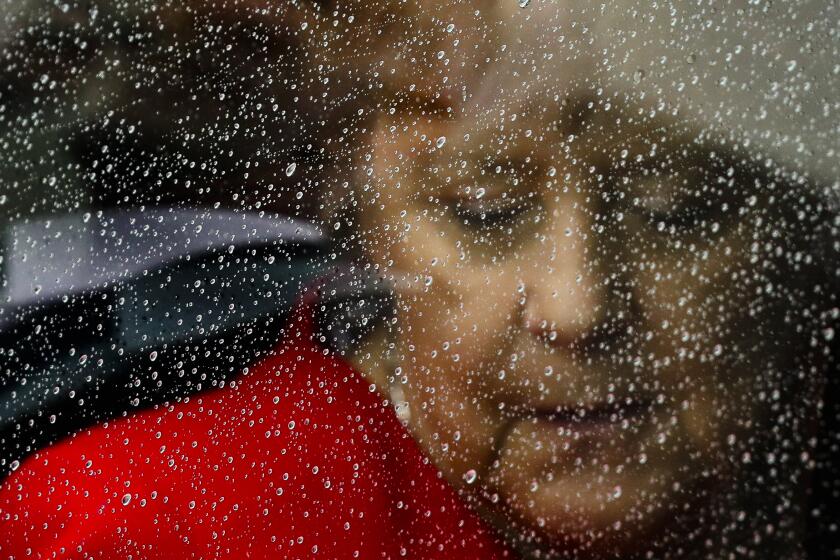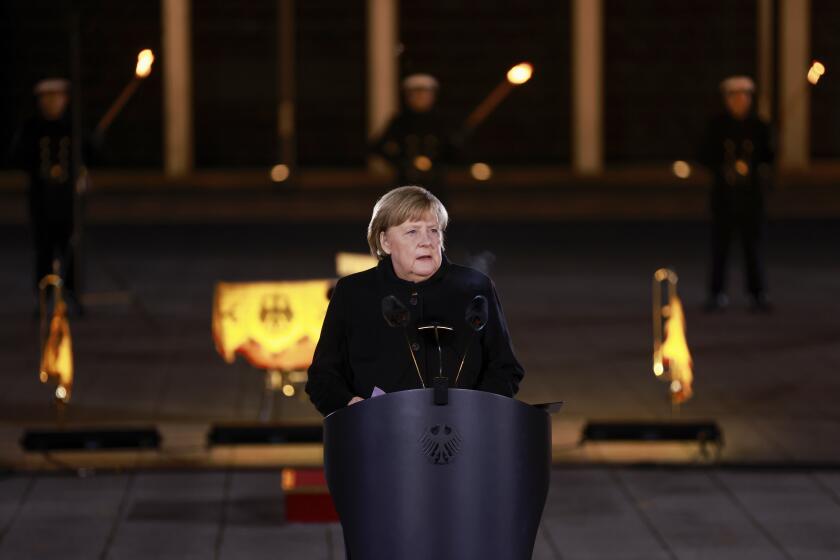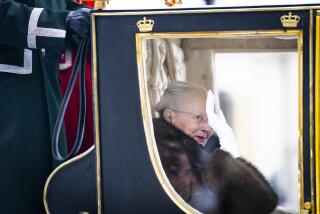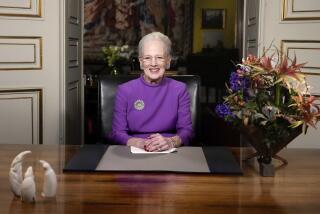End of an era: Angela Merkel’s last full day as Germany’s leader after 16 years
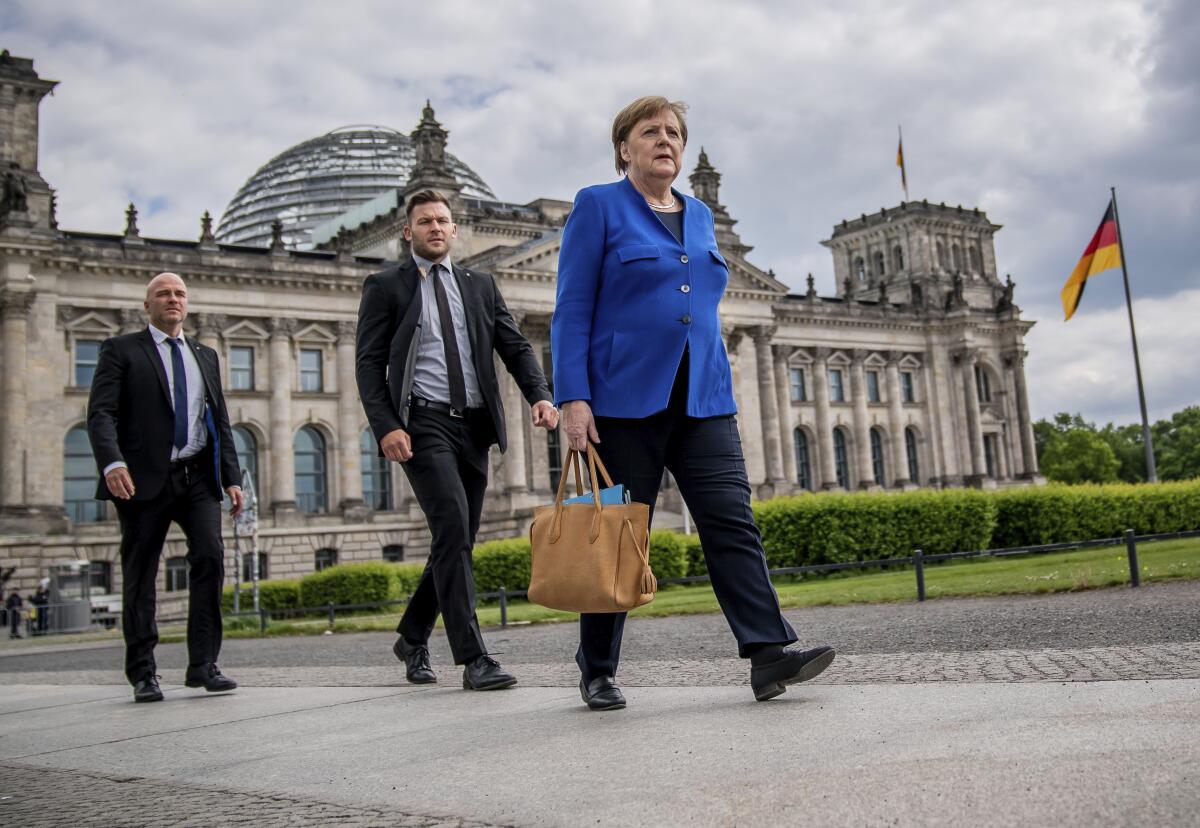
BERLIN — Angela Merkel was assured of a place in the history books as soon as she became Germany’s first female chancellor Nov. 22, 2005.
Over the next 16 years, she was credited with raising Germany’s profile and influence, working to hold a fractious European Union together, managing a string of crises and being a role model for women.
Now that near-record tenure is ending with her leaving office at age 67 to praise from abroad and enduring popularity at home. Her designated successor, Olaf Scholz, is expected to take office Wednesday.
Merkel, a former scientist who grew up in Communist East Germany, is bowing out about a week short of the record for longevity held by her onetime mentor, former Chancellor Helmut Kohl, who reunited Germany during his 1982-1998 tenure.
While Merkel perhaps lacks a spectacular signature achievement, the center-right Christian Democrat came to be viewed as an indispensable crisis manager and defender of Western values in turbulent times.
She served alongside four U.S. presidents, four French presidents, five British prime ministers and eight Italian premiers. Her chancellorship was marked by four major challenges: the global financial crisis, Europe’s debt crisis, the arrival of vast numbers of refugees in Europe in 2015-16 and the COVID-19 pandemic.
Angela Merkel, a once-obscure scientist who claimed the global spotlight, leaves a mixed legacy as her 16-year tenure as Germany’s chancellor ends.
“It’s undeniable that she’s given Germany a lot of soft power,” said Sudha David-Wilp, the deputy director of the Berlin office of the German Marshall Fund of the United States. “Undoubtedly, she’s elevated Germany’s image in the world.
“When she first came onto the scene in 2005, a lot of people underestimated her, but she grew in stature along with Germany’s role in the world,” David-Wilp added. Others in Europe and beyond “want more of an active Germany to play a role in the world — that may not have been the case before she was in office, necessarily.”
In a video message at Merkel’s final European Union summit in October, former President Obama thanked her for “taking the high ground for so many years.”
“Thanks to you, the center has held through many storms,” he said.
Outgoing Chancellor Angela Merkel has made what is likely her final appeal before leaving office for Germans to get vaccinated against COVID-19.
Appreciation from her counterparts over the years was genuine, although there was plenty of friction as well. Merkel always sought to keep the EU as tightly knit as possible but strongly defended Germany’s interests, clashing with Greece during the euro debt crisis and disagreeing with Hungary, Poland and others over their refusal — unlike Germany — to host migrants arriving in Europe.
At home, her record is also a mixed bag. She leaves Germany with lower unemployment and healthier finances, but also with well-documented shortcomings in digitization — many health offices resorted to fax machines to transmit data during the pandemic — and what critics say was a lack of investment in infrastructure.
After announcing in 2018 that she wouldn’t seek a fifth term, Merkel failed to secure a smooth transition of power in her own party, the CDU, which slumped to defeat in Germany’s September election.
The incoming governing coalition under Scholz, a Social Democrat, says it wants to see “more progress” for Germany after years of stagnation.
Breaking News
Get breaking news, investigations, analysis and more signature journalism from the Los Angeles Times in your inbox.
You may occasionally receive promotional content from the Los Angeles Times.
But Germans’ overall verdict on Merkel appears to remain favorable. During the September election campaign, from which she largely was absent, Merkel’s popularity ratings outstripped those of her three would-be successors. Unlike her seven predecessors in postwar Germany, she is leaving office at a time of her choosing.
Merkel’s body language and facial expressions sometimes offered a glimpse of her reactions that went beyond words. She once lamented that she couldn’t put on a poker face: “I’ve given up. I can’t do it.”
She was never the most glamorous of political operators, but that was part of her appeal. Merkel continued to take unglamorous walking holidays, was occasionally seen shopping at the supermarket and lived in the same Berlin apartment as she did before taking the top job.
Named “The World’s Most Powerful Woman” by Forbes magazine for the past 10 years in a row, Merkel steps down with a legacy of breaking through the glass ceiling of male dominance in politics — although she also has faced criticism for not pushing harder for more gender equality.
“Angela Merkel brought class and dignity to a very important position and made very hard decisions ... and did so based upon principle,” former President George W. Bush told German broadcaster Deutsche Welle in July. He described her as “a compassionate leader, a woman who was not afraid to lead.”
More to Read
Sign up for Essential California
The most important California stories and recommendations in your inbox every morning.
You may occasionally receive promotional content from the Los Angeles Times.
